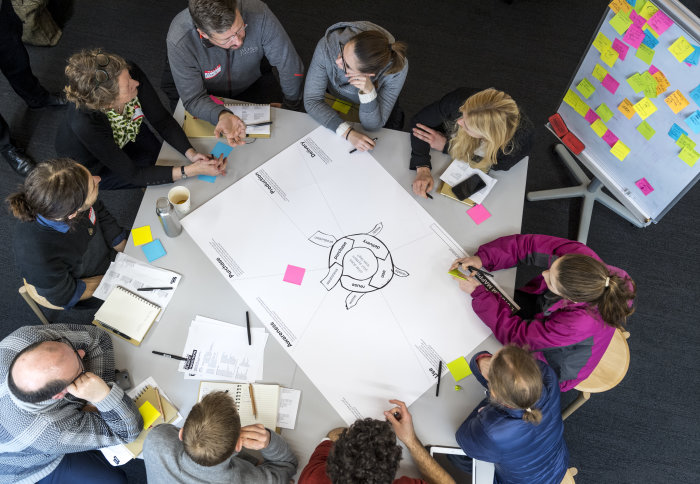Leading experts collaborate at Imperial to tackle plastic pollution

Students, scientists, sustainability experts and big brands gathered at Imperial to find creative solutions to the plastic pollution crisis.
The Plastic Hackathon, spearheaded by sustainability campaigner Dhruv Boruah and developed and run by Dr Leila Sheldrick from Imperial took place at the College’s Dyson School of Design Engineering earlier this month.

The event brought together over 100 individuals to find suitable solutions to help tackle global plastic pollution, including industry experts, scientists, students and sustainability champions from businesses such as Just Eat and Marks & Spencer.
At the Hackathon teams were challenged to find alternatives to current plastic packaging, or design solutions that promote its reuse. This was focused on five key areas: grocery packaging, grab and go food, takeaway meals, internet shopping and personal care items. Imperial students from the Dyson School of Design Engineering supported the teams as they developed their projects.
Key industry representatives
The Hackathon was another example of how Imperial College London and its students are pioneering innovation right from idea generation to execution. Dhruv Boruah Organiser of the Plastic Hackathon
The teams then pitched their ideas to an expert panel of key industry representatives, entrepreneurs and impact investors.
The winning team, called ‘Mindful Minis: Sample, Travel, Repeat’, focused their efforts on reducing plastic pollution at airport security. Their idea is a system of pop-up shops selling reusable pouches of cosmetics which could then be returned and reused at other airports with partnered stores.
Other finalists included the ‘Tupper Club’ who attempted to reinvent the lunchbox and takeaway dining experience using a Tupperware ‘drop and wash’ subscription model.
Impactful solutions
Dr Leila Sheldrick, lecturer in Industrial Design at the Dyson School of Design Engineering, developed the Hackathon in collaboration with Dhruv. She said: “Our students are trained to work across disciplines to bring ideas together and realise impactful solutions. Working with the guest experts visiting us on the day, they were perfectly placed to drive forwards idea development, and now to work to take the concepts into the real world.”
Dhruv Boruah is calling for greater open collaboration and coordination to ensure solutions are found to the mounting plastic problem. He said: “The Hackathon was another example of how Imperial College London and its students are pioneering innovation right from idea generation to execution.
“The pioneering Plastic Hackathon not only delivered by getting young people to work with industry experts to fix their future but we also managed to connect stakeholders from the entire value chain to foster cross-sector collaboration to achieve a circular economy.
“The next steps are to spend some time with the individual teams, get to know their motivation and work with them to bring these solutions to market. And obviously to the next Hackathon to inspire the country from awareness to solutions because time is running out!”
Article text (excluding photos or graphics) © Imperial College London.
Photos and graphics subject to third party copyright used with permission or © Imperial College London.
Reporter
Joanna Wilson
Communications Division




